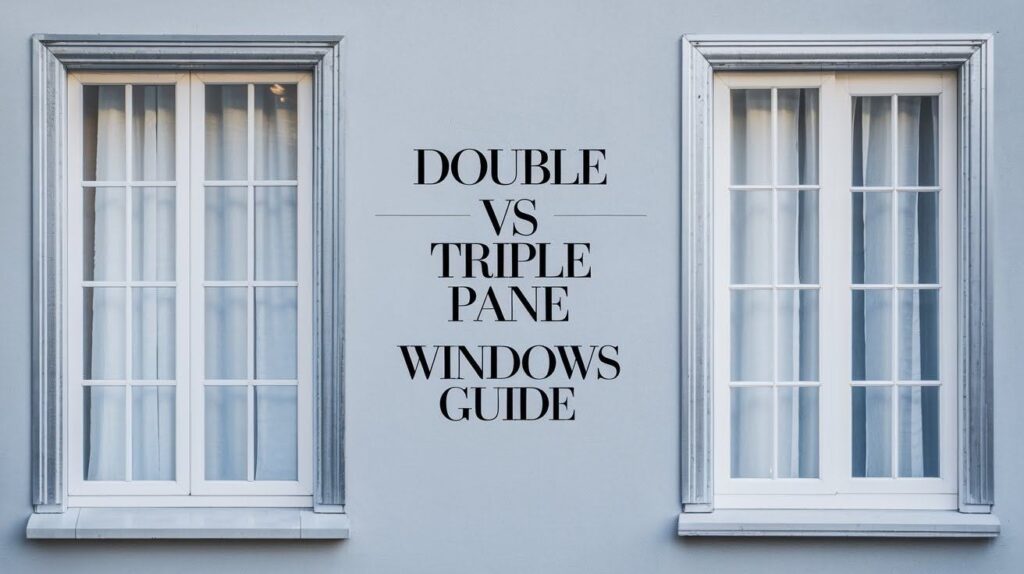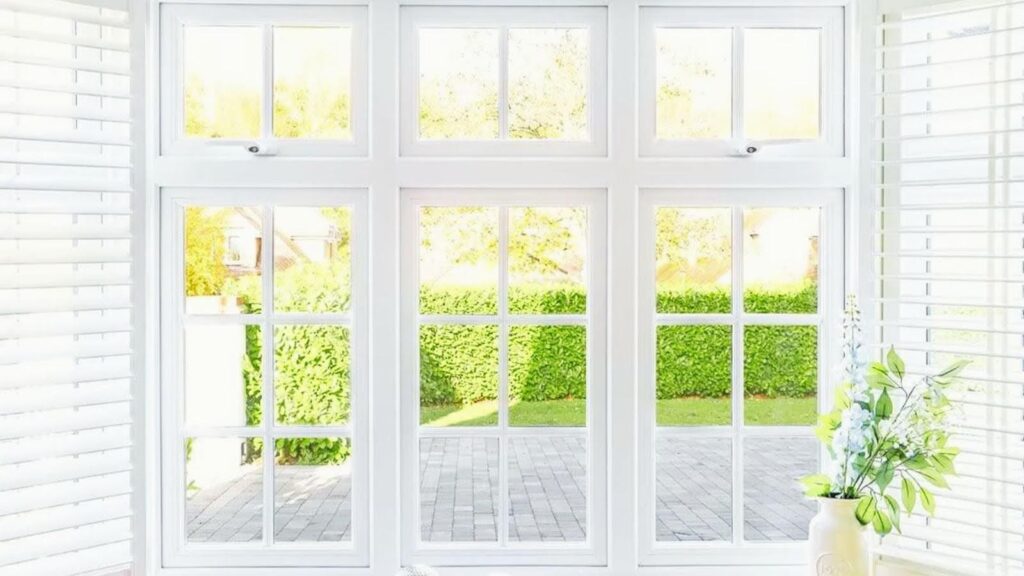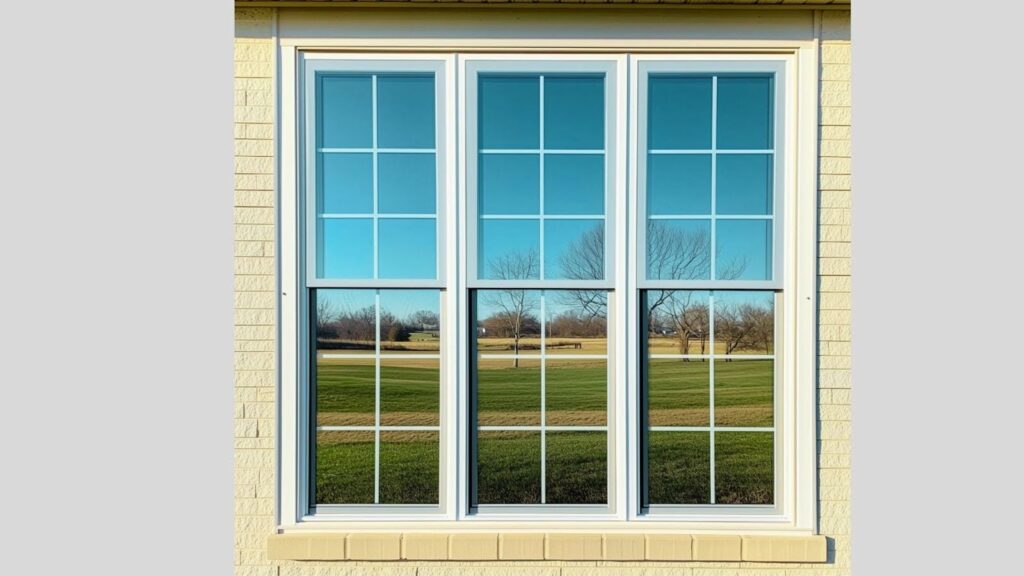Choosing the right windows for your home can feel overwhelming. I get it. You want to save on energy bills, keep the noise out, and make a smart investment.
That’s why I’m breaking down double pane vs triple pane windows in this article.
I’ll show you the real differences between these two options, what works best for different climates, and how to match them to your budget.
We’ll cover structure, energy savings, noise control, costs, and installation tips. By the end, you’ll know exactly which window type fits your home.
Let’s figure this out together.
What Are Double-Pane Windows?
Double-pane windows feature two glass layers with insulating gas between them, offering better energy efficiency than older single-pane designs.
These windows have two sheets of glass with argon or krypton gas between them. This gas provides insulation. Many include low-E coatings that block UV rays.
They’re affordable and widely available. They reduce your energy bills by keeping heat in during winter and out during summer. They also cut down outside noise.
In extreme climates or very noisy areas, they might not be enough.
What Are Triple-Pane Windows?
Triple-pane windows use three glass layers with two insulated gaps, providing top-tier thermal resistance and sound blocking for demanding conditions.
These windows have three sheets of glass with two gas-filled gaps between them. They’re heavier and need professional installation.
They deliver maximum energy savings and block sound extremely well. Perfect for noisy areas. The temperature stays consistent throughout your rooms.
They cost 15 to 30 percent more than double-pane. The extra weight might require stronger frames. They let in slightly less natural light.
Advantages and Disadvantages of Double-Pane Windows
Double-pane windows offer solid performance at a reasonable price, though they have limitations in extreme weather and high-noise environments.
Advantages
- Double-pane windows fit most budgets and are widely available. They work with all window styles like double-hung, casement, and sliding.
- They cut energy bills by reducing heat loss in winter and blocking heat in summer. Your HVAC system runs less often.
- These windows block outside noise better than single-pane options. Your home feels more peaceful.
Disadvantages
- They struggle in extreme climates. Freezing winters or intense summer heat can overwhelm their insulation capacity.
- The soundproofing is moderate. If you live next to a highway or airport, you’ll still hear significant noise.
- In harsh conditions over many years, the seals can degrade faster than triple-pane options.
Advantages and Disadvantages of Triple-Pane Windows
Triple-pane windows offer maximum energy savings and sound blocking but come with higher costs and installation requirements to consider.
Advantages
- Triple-pane windows deliver exceptional energy efficiency. Your heating and cooling costs drop significantly over the years.
- They block noise far better than other options, perfect for busy streets or urban settings.
- The temperature in your rooms stays consistent with no cold or hot spots.
Disadvantages
- The upfront cost runs 15 to 30 percent higher than double-pane windows. That’s a real investment.
- The extra glass makes them heavier too. You might need reinforced frames to support the weight.
- They let in slightly less natural light because of the additional glass layer. Most people don’t notice, but it’s worth considering if you love bright spaces.
Performance Comparison: Double vs Triple Pane
Here’s a side-by-side look at how these window types stack up across key factors that matter to your home.
| Feature | Double Pane | Triple Pane |
| Glass Layers | 2 panes | 3 panes |
| Insulating Gaps | 1 gap with argon or krypton gas | 2 gaps with insulating gas |
| Energy Efficiency | Good performance for most climates | Superior insulation, ideal for extreme temperatures |
| Noise Reduction | Moderate sound blocking | Excellent noise control, perfect for loud areas |
| Upfront Cost | Lower, budget-friendly | Higher, but saves money long-term |
| Best Use | Most homes in moderate climates | Cold regions, noisy areas, long-term homes |
Noise Reduction Considerations
Understanding how windows block sound helps you choose the right option for peace and quiet in your home.
Sound Transmission Class (STC) rates how windows block everyday noise. Outdoor Indoor Transmission Class (OITC) measures low-frequency sounds like traffic rumble or airplane noise.
Ask for these numbers when shopping.Different glass thicknesses stop different sound frequencies.
More space between panes means less sound gets through. Gas fills like argon and krypton reduce sound transmission.
Laminated glass and quality weatherstripping add extra sound barriers. Professional installation matters even if the best windows fail if installed poorly.
Triple-pane windows block slightly more noise than double-pane. The difference is noticeable but not huge. Both beat single-pane windows significantly.
Installation & Maintenance
Proper installation and minimal upkeep keep your windows performing well for decades without constant attention.
Triple-pane windows weigh more than double-panes. This extra weight often requires stronger frames. Your contractor might need to reinforce the window opening.
Professional installation protects your investment. Experts ensure proper sealing. They prevent air leaks. They guarantee long-term durability.
Modern window materials need little maintenance. Vinyl, fiberglass, and treated wood resist weather damage. Clean the glass occasionally. Check the seals every few years. That’s about it.
Choosing the Right Option
Your budget, climate, noise levels, and personal preferences all guide which window type makes sense for your home.
Double-pane windows cost less upfront. They’re perfect when money is tight. Triple-pane windows require more investment now but pay back through energy savings.
Live where winters freeze or summers bake? Triple-pane windows protect you better. Moderate climates do fine with double-pane.
Urban homes need serious sound blocking. Highway nearby? Is the airport closed? Choose a triple-pane. Quiet suburbs work well with double-pane.
Think about your window style. Consider frame materials like vinyl, wood, or fiberglass. Some people prefer maximum natural light. Others prioritize insulation over brightness. Your lifestyle matters most.
Conclusion
I’ve replaced windows in my own home, and the difference in comfort amazed me. Double pane vs triple pane windows both offer real benefits.
Double-pane gives you solid energy savings and noise control without stretching your budget. Triple-pane delivers maximum insulation and quiet if you’re ready to invest more.
Talk to a local window professional. They’ll assess your home’s specific needs. Your perfect window solution is out there.
What’s your biggest concern: energy bills, noise, or upfront costs? Let me know in the comments below.
Frequently Asked Questions
Are triple-pane windows worth the extra cost?
Yes, if you live in extreme climates or very noisy areas. The energy savings and comfort improvements pay back over time. For moderate conditions, double-pane usually provides enough value.
How long do double-pane and triple-pane windows last?
Both types typically last 15 to 20 years or more with proper installation and care. The sealed gas between panes can lose effectiveness over time, but quality windows maintain performance for decades.
Can I replace my single-pane windows with triple-pane?
Absolutely, but check your frames first. Triple-pane windows are heavier and might need reinforced frames or new window openings. A professional can evaluate your current structure and recommend the best approach.
Do triple-pane windows really block that much more noise?
They block noticeably more sound than double-pane, especially low-frequency noise like traffic. The difference is meaningful for homes near busy roads. For average neighborhoods, double-pane provides adequate noise reduction.
Will triple-pane windows make my home darker?
The extra glass layer reduces natural light slightly, but most homeowners don’t notice a significant difference. If maximum brightness is critical to you, discuss glass options and coatings with your installer.




